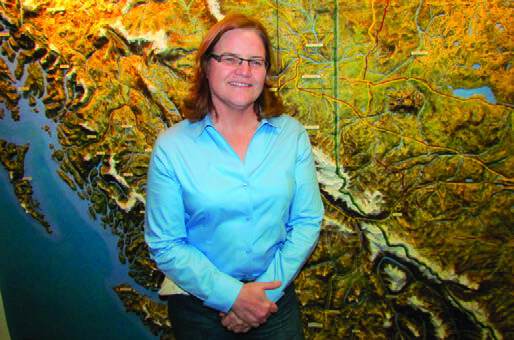Have you ever taken off your Carhartts after a long day in the field, fallen exhausted into your bunk in a tent in the middle of nowhere, only to find your field pants standing up by themselves the next morning, exactly where you left them the night before? And you’re not surprised because, at this point in the field season, nothing surprises you anymore? It’s likely you’re bushed. “Bushed” refers to the range of indicators geologists, geophysicists, students, field helpers and drillers feel after a long field season, after too much camp food, too many bugs and too long away from home. “As soon as you think you’re not bushed, then you’re bushed,” says Amber Henry Jutras, project geologist with Teck Resources Limited. In July 2017, Mineral Exploration magazine surveyed a cross-section of the B.C. mineral exploration community to compile seven key questions to find out: Are you bushed?
1. What’s going on with your hair?
Hair length is a uniform indicator that you have been in the field too long. Both men and women can measure field time based on their hair length and the amount of time they spend discussing hair with others.
“When the moustache part of my beard grows into my mouth, and I can no longer drink or eat without getting messy, then it’s been about three weeks and time for a trim,” says Andy Randell, principal geoscientist at Strata Geodata Services.
2. How do you smell?
Rustic showers and lake swims are refreshing and fun at the beginning of the field season, but after weeks of wearing a permanent layer of bug dope, sunscreen and sweat, and running low on fresh clothing, personal odour is a sure sign you’re bushed.
3. Do you have your “field goggles” on?
“When one of my geologists comments that the barren wasteland or malarial swamp they have been working in is ‘beautiful in its own way,’ I know it’s time to call in a medivac,” says Rohan Wolfe, an experienced exploration geologist.
This change of perspective applies to people, too, which leads neatly into the next question…
4. Is camp life becoming a soap opera?
Geophysicist Julia King describes her indicator for when everyone is bushed with one word: “drama.”
Although many a long, happy relationship may have started in a camp, there are some situations where getting close in close quarters isn’t a great idea. Gossip and political discussions should also be avoided.
5. How do you feel about going home? Home? I thought this was my home?
Although field camps are rarely described as comfortable, after a few weeks they start to feel like home. You have so many in-jokes that newcomers to camp can barely understand what you’re saying. Your smell, language, routine and relationships start to feel so normal that you may forget about life outside of camp.
6. Are you having difficulty recalling your “real life”?
Landing back in civilization, where you don’t have a camp cook or a helicopter to take you where you need to go, can be quite a shock. Some geologists even suffer from shin splints after walking on concrete again after so long on uneven ground!
Marisol Valerio, geotechnical engineer at Golder Associates, knows she’s bushed when “I forget my credit card PIN, or the fact that I have to pay for things when I’m back in civilization.”
7. Are you making mistakes?
When you’re bushed, everything feels difficult: making decisions, finding things or performing simple tasks. Your mind is mush, and staying calm and regulating your mood from day to day, or even hour to hour, feels impossible.
“Making bad or unsafe decisions and not bothering with safety gear in general is a good sign someone is bushed,” says Maggie Harder, geologist, resource estimation, at B2Gold.
But, seriously…
Although we laugh about it, there is a serious side to being bushed. As physical and mental exhaustion set in, mistakes can be made.

“On field projects, changes in behaviour in yourself, in others and in project leaders must be taken seriously as warning signals of potential growing risk,” explains Janice Fingler, chair of the AME Environment, Health and Safety Committee.
Studies show that the underlying contributors to being bushed, such as fatigue and stress, can decrease our awareness of surroundings and impair our decision-making abilities.
“To navigate safety in a dynamic field environment, we need all eyes looking and all ears listening for patterns and anomalies, including behaviours,” says Fingler. “Noticing signs of decreased awareness in each other and providing support to deal with it are therefore crucial to the health and safety of the whole team. That’s something everyone can be on board with.”
